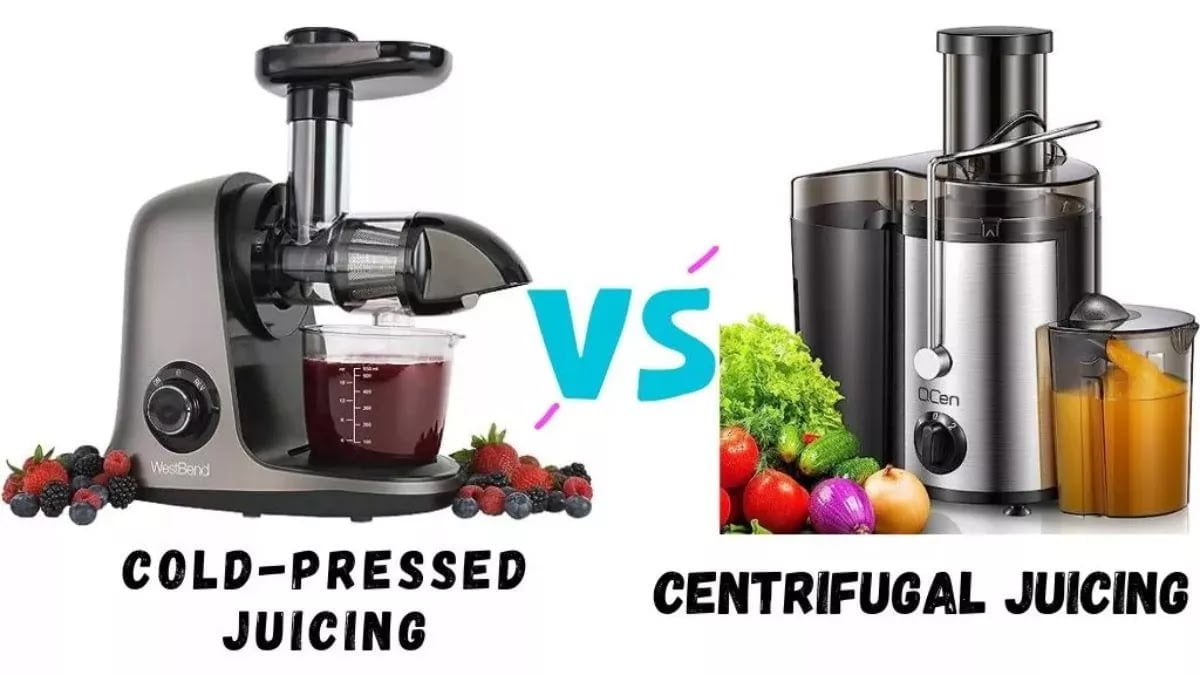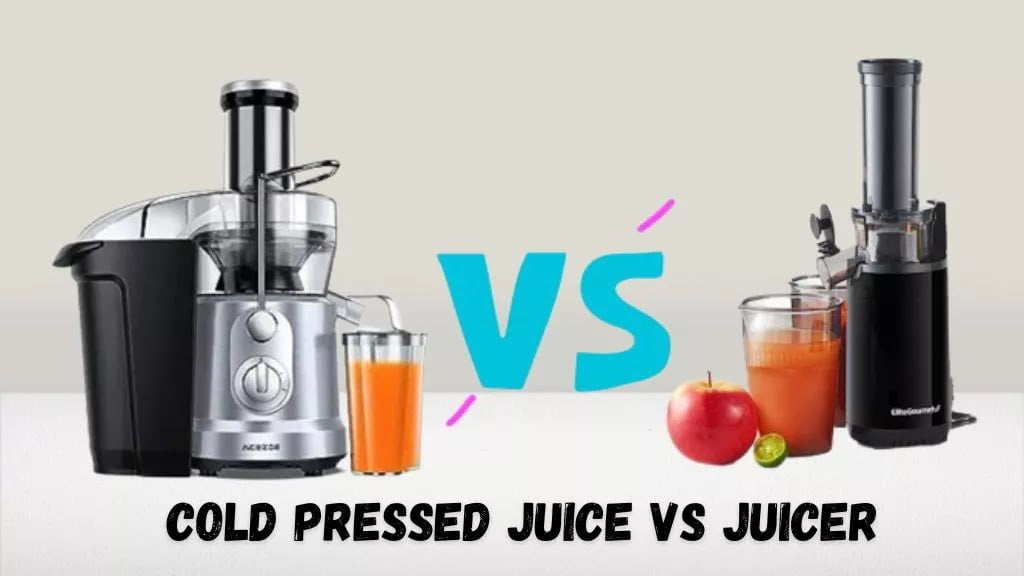
We may earn money or products from the companies mentioned in this post.
Fresh juices have become more popular in today’s health-conscious society. Cold-pressed juice and centrifugal juice are two popular choices among them. Both provide a simple way to eat fruits and vegetables, but they have different nutritional profiles and extraction processes. In order to compare the differences between cold-pressed juice and centrifugal juice, this article will look at aspects including nutrition, flavor, price, and convenience.
Compare – Cold Pressed Juice vs Centrifugal Juice
| Aspect | Cold Pressed Juice | Centrifugal Juice |
|---|---|---|
| Extraction Method | Uses hydraulic press or slow masticating juicer to crush fruits and vegetables, extracting juice without heat | Utilizes a fast-spinning blade to shred fruits and vegetables, separating juice through centrifugal force |
| Oxidation | Minimal oxidation due to low heat and slow process | Higher oxidation due to heat generated by fast-spinning |
| Nutrient Retention | Retains more nutrients, enzymes, and vitamins | This may result in some nutrient loss due to heat and aeration |
| Juice Quality | High-quality juice with vibrant color and richer flavor | Juice may have a slightly foamy texture and less intense flavor |
| Shelf Life | Shorter shelf life (usually 1-3 days) due to minimal preservatives | Longer shelf life (up to 72 hours) with the use of preservatives |
| Yield | Higher yield of juice from the same amount of produce | Slightly lower yield compared to the cold-pressed method |
| Pulp Content | Drier pulp with most juice extracted | Wetter pulp with some residual juice |
| Noise | Quieter operation | Louder operation due to high-speed spinning |
| Juice Extraction Speed | Slower process due to the pressing or masticating action | A faster process as the spinning blade quickly extracts juice |
| Cost | Generally more expensive due to the complex machinery and longer process | Usually more affordable as the machines are simpler |
| Recommended Produce | Suitable for a wide range of fruits and vegetables, including leafy greens | Better for firmer fruits and vegetables, may struggle with leafy greens |
| Cleaning | More involved cleaning process due to more components | Easier and quicker cleaning with fewer parts |
| Environmental Impact | Typically more eco-friendly, as it uses less energy and produces less waste | May consume more energy and create more waste |
| Popular Brands | Suja, Blueprint, Pressed Juicery | Breville, Hamilton Beach, Cuisinart |
Cold-Pressed Juicing Check price on Amazon
Nutrients
Juices are often consumed for their rich nutrient content, and understanding how the juicing process affects the concentration of these vital elements is crucial. Cold-pressed juice, as the name suggests, involves extracting juice by applying pressure and squeezing the produce. This method generally results in higher retention of nutrients due to its low-heat extraction process. The absence of heat minimizes oxidation and helps preserve fragile enzymes and vitamins.
In contrast, centrifugal juicers extract juice by grinding fruits and vegetables and then separating the juice from the pulp through centrifugal force. This process involves the generation of heat, which can potentially lead to a breakdown of heat-sensitive nutrients. Consequently, some vitamins, enzymes, and antioxidants might undergo degradation during the centrifugal juicing process.
Comparing the nutrient content of cold-pressed juice and centrifugal juice reveals that the former typically contains a higher concentration of vitamins, minerals, and enzymes. The low-heat extraction method employed in cold-pressed juicing helps maintain the integrity of nutrients, resulting in a more nutrient-dense product.
Taste
One’s propensity to drink juice may be significantly influenced by its flavor. The slow juicing method offers the best taste retention in cold-pressed juice. Fruits and vegetables’ essence is successfully captured throughout the extraction process, creating a more robust flavor profile. Cold-pressed juice is renowned for its full-bodied, rich tastes, which are sometimes thought to be more pleasurable by lovers.
As an alternative, high-speed cutting and grinding are used in centrifugal juicing. Heat is produced during this procedure, which may affect how the juice turns out. Some contend that a little “cooked” taste is introduced to the juice as a result of the heat created during centrifugal juicing. While some people may not notice the difference, some with more sophisticated palates could detect it as contrasted to cold-pressed juice.
In conclusion, centrifugal juice may have a somewhat changed flavor as a result of the extraction method, but cold-pressed juice tends to deliver a more powerful and true taste sensation.
Cost
Cost plays a significant role in determining dietary choices, and the financial aspect of juicing should not be overlooked. Cold-pressed juice has gained a reputation for being relatively more expensive compared to centrifugal juice. The sophisticated juicing equipment, longer preparation time, and higher cost of sourcing organic produce contribute to the premium price tag of cold-pressed options.
On the other hand, centrifugal juicers are more affordable and readily available. The extraction process is relatively simpler and faster, making them a more budget-friendly choice, particularly for individuals who may be new to juicing or seeking a more cost-effective solution.
Furthermore, considering the long-term cost of juicing, cold-pressed juice might place a larger dent in one’s wallet. Owing to the larger quantities of produce required to yield a similar volume of juice, the ongoing expenses can quickly accumulate for regular consumers of cold-pressed juice.
Convenience
Convenience is often a deciding factor when incorporating juicing into a busy lifestyle. Cold-pressed and centrifugal juices differ in terms of preparation, storage, and portability.
Preparing cold-pressed juice requires more time and effort. The slow extraction process typically necessitates chopping produce into small pieces and operating a specialized juicer. The cleaning and maintenance of the equipment can also be more time-consuming. However, cold-pressed juice can often be made in larger batches and stored in the refrigerator for up to 72 hours, offering convenience in terms of preparedness and accessibility.
Centrifugal juicers, on the other hand, offer a quicker and more straightforward approach to juicing. The high-speed extraction process reduces the time required for preparation and minimizes the effort needed to clean the juicer afterward. However, due to the heat generated during centrifugal juicing, the resulting juice should ideally be consumed immediately to minimize nutrient loss and maintain optimal taste.
In terms of portability, both types of juice solutions can be carried in portable containers. Cold-pressed juice, with its longer shelf life, provides the advantage of being transportable for a longer duration without significant degradation of taste and nutrient content.
Conclusion:
After a comprehensive evaluation of the differences between cold-pressed juice and centrifugal juice, it becomes clear that each method has its own advantages and considerations. Cold-pressed juice boasts higher nutrient retention and fuller flavors, albeit at a higher cost and increased preparation time. Meanwhile, centrifugal juice offers affordability, speed, and simplicity, but at the potential expense of some nutrient loss and slight flavor alterations.
Ultimately, the choice between the two types of juice depends on individual preferences, priorities, and lifestyle factors. For those seeking maximum nutrition and taste, cold-pressed juice might be the preferred option. However, those concerned with budget and time constraints may find centrifugal juice a more practical choice.
Seeking a well-rounded perspective on this matter is encouraged. Whether opting for cold pressed juice, centrifugal juice, or an alternative method, readers are advised to conduct further research and experimentation to determine the best approach to juicing that suits their unique needs and preferences.





![Top 5 Best KitchenAid Mixer Attachments in 2023 [Review]](https://ex-kitchen.com/wp-content/uploads/2023/10/Top-5-Best-KitchenAid-Mixer-Attachments-in-2023-Review.jpg)

![The 5 Best Juicers for Celery in 2023 [Expert Reviews]](https://ex-kitchen.com/wp-content/uploads/2023/08/The-5-Best-Juicers-for-Celery-in-2023-Expert-Reviews.jpg)
![The 5 Best Stand Mixer for Bread Dough in 2023 [Expert Reviews]](https://ex-kitchen.com/wp-content/uploads/2023/08/The-5-Best-Stand-Mixer-for-Bread-Dough-in-2023-Expert-Reviews.jpg)